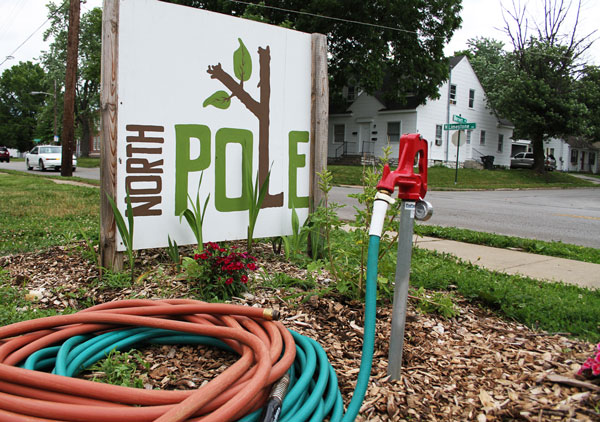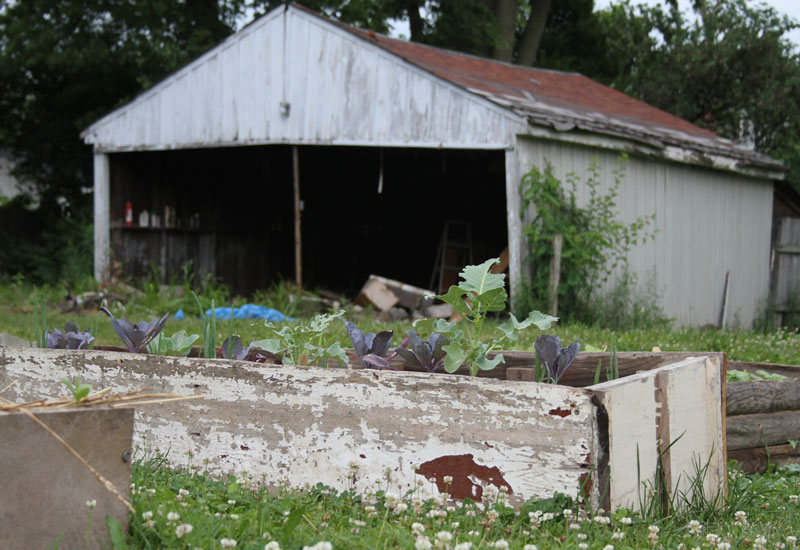By Beth Connors-Manke
It seemed completely appropriate to interview Ryan Koch, the executive director of Seedleaf, on his front porch. Koch sat in a rocking chair; I took up the “grandpa glider” that Koch tells me is Amish-made.
Hospitable and relaxed, Koch asked me if I needed a drink as I stationed myself on the glider. Northerner that I am, I asked if the tea he offered was unsweetened. He said “no” in a nice way to my silly question, and I opted to remain drinkless during the interview. Looking back now, the sweet tea might have helped, as vertigo set in later in the conversation.
We chatted amicably about something or other, but as soon as I slid in my first interview question, Koch was ready. “We’ve got 15 gardens, the furthest of which is a half-acre out at Coldstream. Seven are market gardens; eight are community gardens.”
If you don’t already know that Seedleaf runs community gardens around town, especially in formerly ignored plots of land on the northside, you must not leave your house or your car. Walk around the northside with your eyes open on a sunny day, and you’ll see strange things: scraggly lots (which probably only produced litter before) will suddenly have hand-made raised wooden boxes full of dirt. Walk by again in a few weeks and that dirt is sprouting something: vegetables. Once your antennae are up, you’ll notice that these boxes multiply when you’re not looking. After you see the small ones, you’ll wonder why you hadn’t already noticed the bigger gardens, such as the London Ferrell Community Garden on Third Street, near Elm Tree.
Seedleaf’s official birth was in fall of 2007, when Koch incorporated it as a non-profit organization. Since then, the Lexington community garden movement has swelled with other gardening outfits, neighborhood associations, schools, churches, and social service organizations planting things up.
It’s this swell, and the success of Seedleaf as a non-profit, that have led to Seedleaf Farms (read “farms” as a verb here). As Koch described it, Seedleaf Farms is a foray into the for-profit side of growing food in urban spaces.
Economic Vertigo
At this point in the conversation, two things happened. A neighbor boy hopped onto the porch. Looking at me, but talking to Koch, he said, “What’s she doing here?” (Evidently, I was an interloper in his domain. When I asked the boy the same question, he didn’t answer.)
Second, I entered the time-space portal where everything is backwards called “Seedleaf Capitalism.” Here’s how it works: Koch starts gardening with his faith community, Communality. That turns out fine, so he starts a non-profit. Then, the non-profit ends up with “piles of money,” so Seedleaf invests in Seedleaf Farms in order to perhaps “lose some money.” If you’re thinking like a regular, I-was-born-in-the-U.S.-and-watch-cable-news capitalist, you won’t get Seedleaf Capitalism; in fact, you’ll automatically misunderstand it. I was disoriented, too, so let me help you with it.
Koch wanted to start Seedleaf Farms for several reasons. Seedleaf, which includes Koch and a team of Seedleafers, including Jeremy Porter who is a large force in the farms venture, wanted to “experiment in what urban micro-farms can and should do.” Also, Koch wanted to “get out ahead of the SEEDS kids.”
Started by Jodie Koch, Ryan’s wife, SEEDS (Service Education and Entrepreneurship in Downtown Spaces) is a youth program for fifth to eighth graders who live in Lexington areas considered “food deserts.” Hoping to get youth interested in the need for healthy fresh food, participants grow and sell fresh produce in the city.
“Getting out ahead of the SEEDS kids” means helping foster a strong urban economy in local (reallocal, like in the lot next door) fresh fruits and vegetables. In this economy, the SEEDS kids would have a future place as growers, marketers, and distributors of food. Will any of them become millionaires plying their kale and collards? Probably not, but remember, this is the inverse universe of Seedleaf Capitalism, in which meaningful work, community, and healthy food are the standards of a good life.
Abundance
Which brings us back to the “piles of money” Seedleaf has. I wondered aloud about how a non-profit during the Great Recession ends up in the black. “People have been very generous to Seedleaf. They like our story.” And, Seedleaf’s overhead is very low; money goes mostly into programs, said Koch.
Although disoriented by the paradoxical workings of Seedleaf Capitalism, in which an economy is made for people (kids, no less!), not people for an economy, I was still clear-sighted enough to be suspicious of Koch’s definition of “piles of money.” Let’s just say, I don’t think Donald Trump and Ryan Koch use the same quantitative measures when assessing their respective “piles of money.” Close observation has led me to believe that Koch is convinced that he lives in a world of abundance, rather than scarcity, which can make a handful of scallions or kohlrabi seem like a jackpot. In that same scenario, too much kohlrabi isn’t a good thing either—it must be given away so that it doesn’t go to waste.
(All that being said, when I asked Koch if I could look in his office closet for the pile of money, he said “no.”)
So, Seedleaf is prepared to lose some money as it experiments with what it calls “a decentralized, multi-site urban farm.” This Seedleaf project is an online store from which fresh produce, live plants, and seeds can be ordered. Right now, InFeed Seeds and Watershed Farm are partners in the Seedleaf Farms enterprise.
“Decentralized” caught my ear, so I asked Koch about that, and then we went back down the Seedleaf Capitalism rabbit hole…
Generally, orders for a basket from Seedleaf Farms can be made online Friday-Wednesday. Market day, held at Third Street Stuff, is Thursday from 4 P.M. to 5: 30 P.M. Visit http://www.seedleaf.org/ for more information.






Leave a Reply